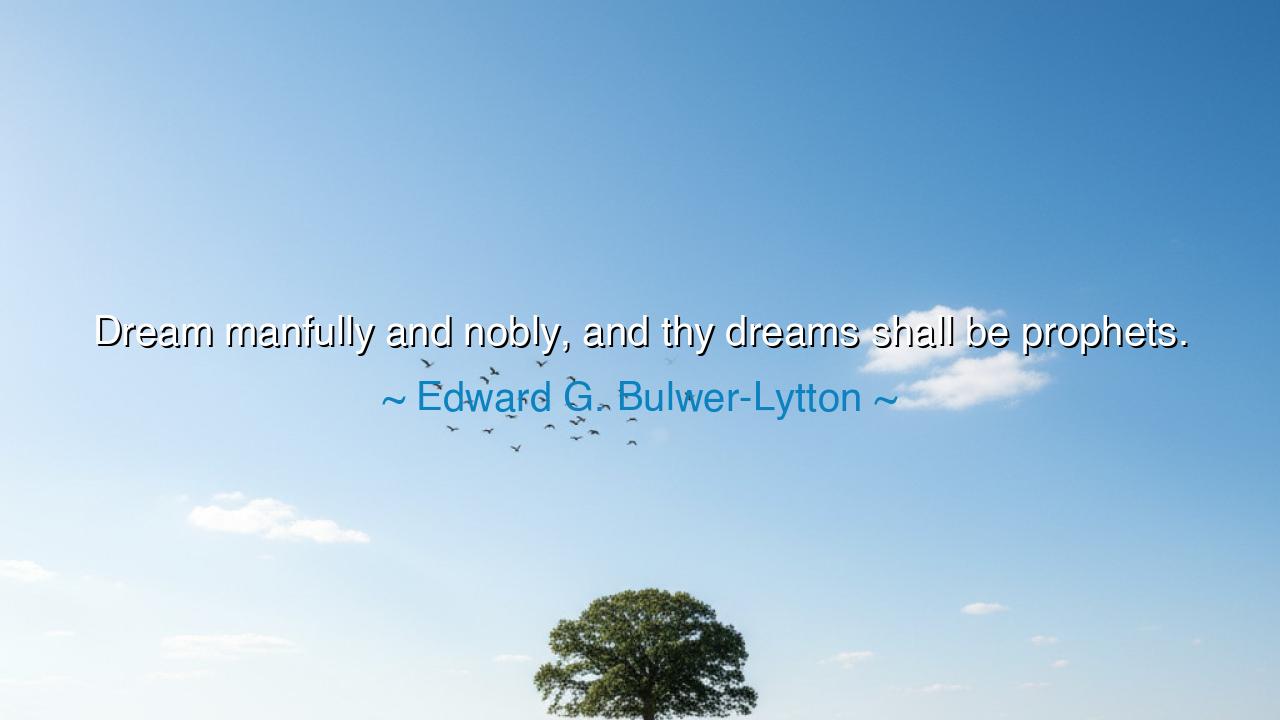
Dream manfully and nobly, and thy dreams shall be prophets.






In the grand tapestry of human aspiration, Edward G. Bulwer-Lytton, the English novelist and statesman, spoke words that gleam with timeless fire: “Dream manfully and nobly, and thy dreams shall be prophets.” These words, though simple in form, resound like a call from the mountains — a summons to dream not as the idle dreamer does, but as the hero, the visionary, the soul who believes that what is imagined with purity and courage will one day come to pass. To dream manfully is to dream with strength, purpose, and integrity; to dream nobly is to dream not only for oneself but for the good of all. And when one dreams in such a way, Bulwer-Lytton tells us, those dreams cease to be mere fantasies — they become prophecies of what shall one day be made real.
The origin of this quote comes from the era of Romantic idealism in the nineteenth century, a time when poetry and philosophy joined hands to elevate the human spirit beyond mere existence. Bulwer-Lytton, known for his eloquence and moral imagination, lived in an age that believed deeply in the power of the mind to shape destiny. His words reflect that sacred conviction — that the universe itself bends toward the will of the dreamer who dares to imagine greatly. For him, dreams were not shadows of wishful thought, but the seeds of creation, planted by those who possess the courage to nurture them through labor, sacrifice, and vision.
To dream manfully is to dream with action in one’s heart. It is not the dream of idle comfort or soft indulgence, but the dream forged in the fires of perseverance. The manful dreamer does not escape reality; he transforms it. He looks upon the world not as it is, but as it could be, and his will becomes the bridge between vision and reality. Likewise, to dream nobly is to elevate one’s vision beyond personal gain — to seek truth, beauty, and the betterment of others. The noble dreamer dreams not of gold, but of greatness; not of power, but of purpose.
History offers us shining examples of such dreamers. Consider Martin Luther King Jr., who stood before a divided nation and declared, “I have a dream.” His vision was not born of selfish ambition, but of moral courage — a dream manful in its faith, noble in its compassion. Though he was not alive to see it fulfilled, his dream became a prophecy, guiding the conscience of generations. The march toward equality began as an image in his heart — proof that when one dreams with courage and virtue, the dream itself becomes a force that shapes reality.
Bulwer-Lytton’s words remind us that dreams are sacred only when they are joined to action. The idle dreamer drifts, but the prophetic dreamer builds. The former dreams of ease, the latter dreams of endurance. The former is a poet of sleep, the latter a poet of life. In the ancient world, prophets were those who spoke truths the present could not yet see; so too, those who dream with moral strength and faithfulness to the good become prophets of the future. The dream itself begins to speak through them, foretelling what the soul of humanity will one day achieve.
Yet this prophecy is not guaranteed — it demands faith and labor. To dream manfully and nobly means to accept the trials that come with great vision. The dreamer will be mocked, misunderstood, and resisted, for the world is slow to accept what is new. But if he holds firm, his dream becomes a torch lighting the path of others. As Galileo, imprisoned for daring to dream that the earth moved around the sun, said, “And yet it moves.” The noble dream, though resisted, never dies; it returns in the hands of those who inherit it, until prophecy becomes history.
So, my children of vision and valor, hear this wisdom: Dream boldly, but dream well. Let your dreams be born of courage, not comfort; of virtue, not vanity. Shape your vision with integrity and perseverance, for dreams without discipline are but smoke. Write them down, work for them, guard them against cynicism, and they will one day speak through your deeds.
In the end, Bulwer-Lytton’s truth stands eternal — that the dreams of the noble heart are not fantasies but foretellings. Every cathedral, every discovery, every act of justice began first as a dream that dared to believe in itself. Therefore, dream with strength, dream with honor, and your dreams shall become your destiny — the prophets of a brighter and more awakened world.






AAdministratorAdministrator
Welcome, honored guests. Please leave a comment, we will respond soon